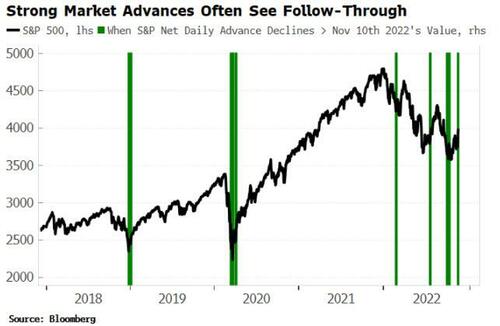Historically High Breadth A Major Shorter-Term Boost For S&P
By Simon White, Bloomberg Markets Live reporter and analyst
A sharp rise in the number of S&P stocks advancing after last week’s soft inflation print is a promising set up for above-average returns in the coming weeks and months.
Breadth studies rely on the assumption that the behavior of the parts can give extra information about the whole. One of the simplest measures of breadth is the net number of stocks in an index advancing on a daily basis.
When this goes from being deeply negative to very positive in a rapid fashion – as it did for the S&P 500 last week – it typically points to above-average returns in the short-to-medium term.
Last Wednesday, the day before the CPI release, the net number of advancing S&P 500 stocks was -424, i.e. almost all stocks fell on the day. The next day, though, after the softer-than-expected inflation data, that number shot up to +467, i.e. almost every stock was up on the day. That’s in the top 0.6% of all readings going back to 1990. Net new advances remained supported on Friday at +130.
How does the S&P go onto fare when we see a number that high or higher? Historically speaking, very well, as we can see in the left table below of forward returns. However, that comes at the cost of higher volatility. The right-hand table shows that volatility going forward tends to pick up when we see such a large number of stocks advancing.
Caveats apply though. The liquidity backdrop remains poor, and recession risk in the US is rising, which would historically imply more downside ahead for stocks.
Moreover, studies like these select specific intervals of the market that condition on only one feature, whereas the liquidity backdrop applies through all time, and has a broader array of inputs that encapsulate a wide range of conditions – rates, growth, inflation – and is therefore likely to be more robust.
That said, though, when the results are particularly compelling as these are, it pays to incorporate them into one’s view. This study shows that, despite the still challenging backdrop for equities, there is a bias towards upside surprises.
Tyler Durden
Mon, 11/14/2022 – 14:05
via ZeroHedge News https://ift.tt/gsW5R8M Tyler Durden

